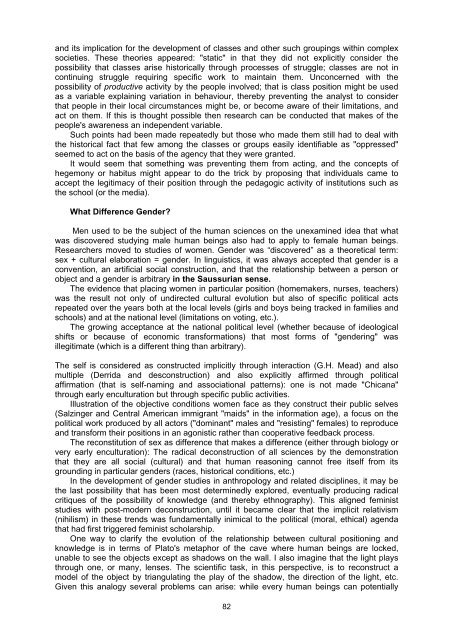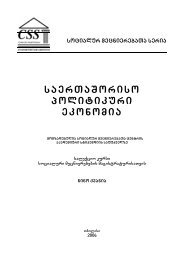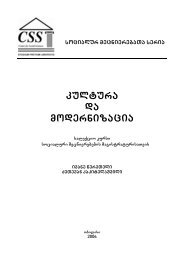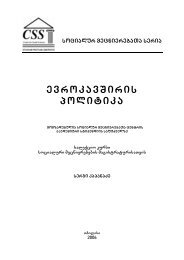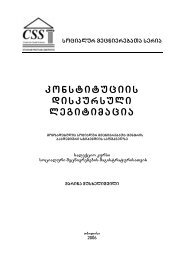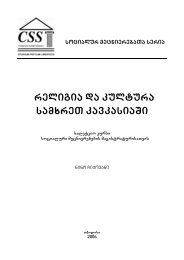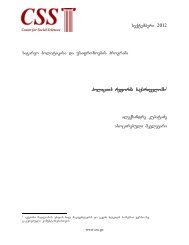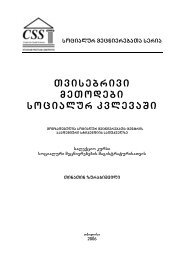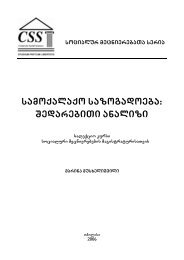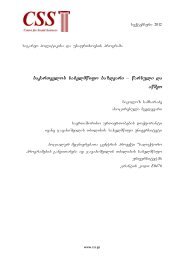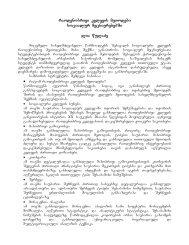Tanamedrove sazogadoeba - Center for Social Sciences
Tanamedrove sazogadoeba - Center for Social Sciences
Tanamedrove sazogadoeba - Center for Social Sciences
Create successful ePaper yourself
Turn your PDF publications into a flip-book with our unique Google optimized e-Paper software.
and its implication <strong>for</strong> the development of classes and other such groupings within complex<br />
societies. These theories appeared: "static" in that they did not explicitly consider the<br />
possibility that classes arise historically through processes of struggle; classes are not in<br />
continuing struggle requiring specific work to maintain them. Unconcerned with the<br />
possibility of productive activity by the people involved; that is class position might be used<br />
as a variable explaining variation in behaviour, thereby preventing the analyst to consider<br />
that people in their local circumstances might be, or become aware of their limitations, and<br />
act on them. If this is thought possible then research can be conducted that makes of the<br />
people's awareness an independent variable.<br />
Such points had been made repeatedly but those who made them still had to deal with<br />
the historical fact that few among the classes or groups easily identifiable as "oppressed"<br />
seemed to act on the basis of the agency that they were granted.<br />
It would seem that something was preventing them from acting, and the concepts of<br />
hegemony or habitus might appear to do the trick by proposing that individuals came to<br />
accept the legitimacy of their position through the pedagogic activity of institutions such as<br />
the school (or the media).<br />
What Difference Gender?<br />
Men used to be the subject of the human sciences on the unexamined idea that what<br />
was discovered studying male human beings also had to apply to female human beings.<br />
Researchers moved to studies of women. Gender was “discovered” as a theoretical term:<br />
sex + cultural elaboration = gender. In linguistics, it was always accepted that gender is a<br />
convention, an artificial social construction, and that the relationship between a person or<br />
object and a gender is arbitrary in the Saussurian sense.<br />
The evidence that placing women in particular position (homemakers, nurses, teachers)<br />
was the result not only of undirected cultural evolution but also of specific political acts<br />
repeated over the years both at the local levels (girls and boys being tracked in families and<br />
schools) and at the national level (limitations on voting, etc.).<br />
The growing acceptance at the national political level (whether because of ideological<br />
shifts or because of economic trans<strong>for</strong>mations) that most <strong>for</strong>ms of "gendering" was<br />
illegitimate (which is a different thing than arbitrary).<br />
The self is considered as constructed implicitly through interaction (G.H. Mead) and also<br />
multiple (Derrida and desconstruction) and also explicitly affirmed through political<br />
affirmation (that is self-naming and associational patterns): one is not made "Chicana"<br />
through early enculturation but through specific public activities.<br />
Illustration of the objective conditions women face as they construct their public selves<br />
(Salzinger and Central American immigrant "maids" in the in<strong>for</strong>mation age), a focus on the<br />
political work produced by all actors ("dominant" males and "resisting" females) to reproduce<br />
and trans<strong>for</strong>m their positions in an agonistic rather than cooperative feedback process.<br />
The reconstitution of sex as difference that makes a difference (either through biology or<br />
very early enculturation): The radical deconstruction of all sciences by the demonstration<br />
that they are all social (cultural) and that human reasoning cannot free itself from its<br />
grounding in particular genders (races, historical conditions, etc.)<br />
In the development of gender studies in anthropology and related disciplines, it may be<br />
the last possibility that has been most determinedly explored, eventually producing radical<br />
critiques of the possibility of knowledge (and thereby ethnography). This aligned feminist<br />
studies with post-modern deconstruction, until it became clear that the implicit relativism<br />
(nihilism) in these trends was fundamentally inimical to the political (moral, ethical) agenda<br />
that had first triggered feminist scholarship.<br />
One way to clarify the evolution of the relationship between cultural positioning and<br />
knowledge is in terms of Plato's metaphor of the cave where human beings are locked,<br />
unable to see the objects except as shadows on the wall. I also imagine that the light plays<br />
through one, or many, lenses. The scientific task, in this perspective, is to reconstruct a<br />
model of the object by triangulating the play of the shadow, the direction of the light, etc.<br />
Given this analogy several problems can arise: while every human beings can potentially<br />
82


